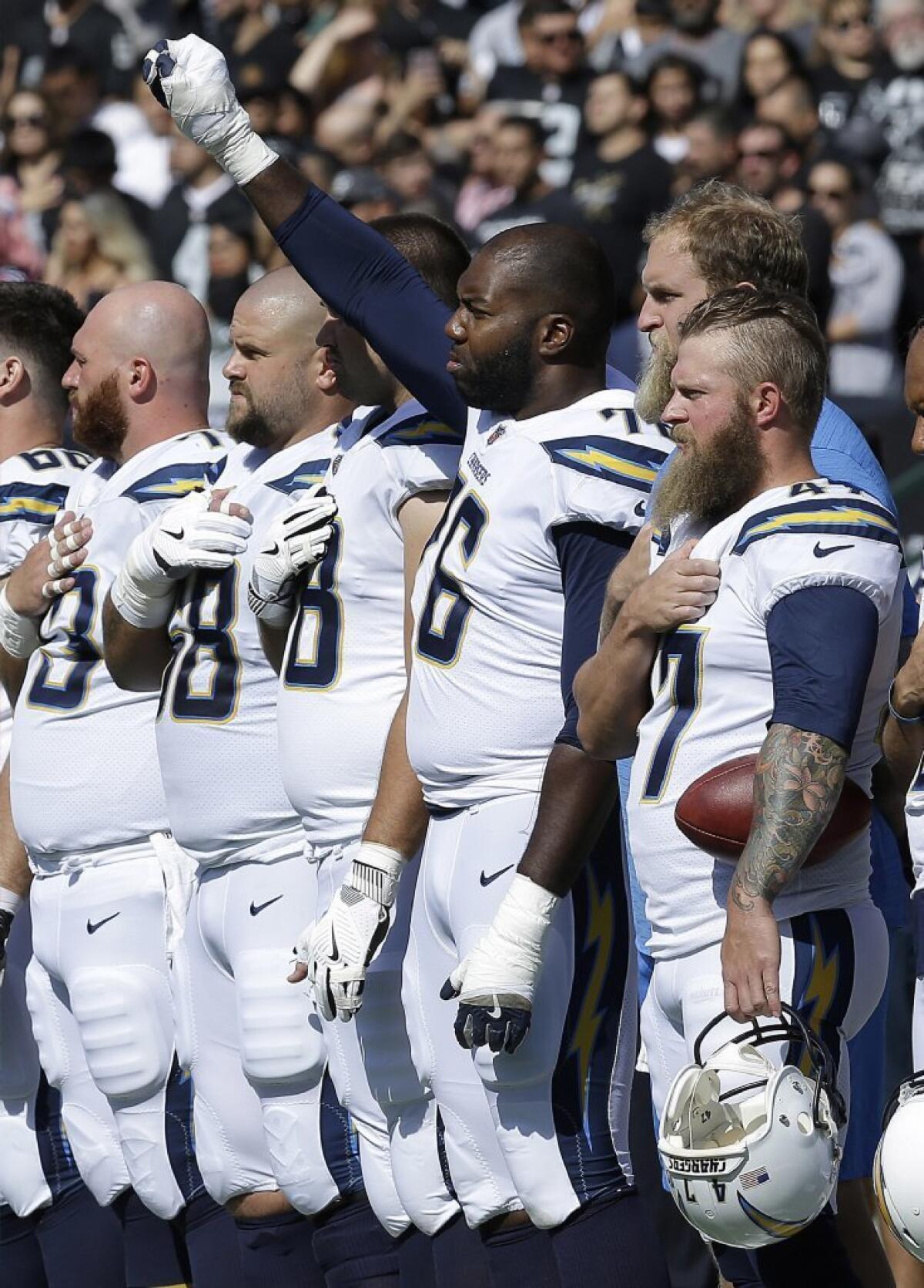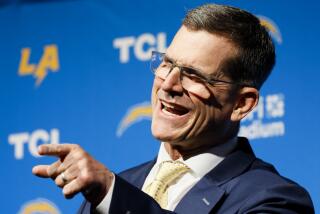Since players weren’t consulted on NFL’s anthem rule, for them it raises a red, white and blue flag
- Share via
Nimble as he is on the football field, Chargers offensive tackle Russell Okung was caught flat-footed last week by the NFL’s new policy on the national anthem.
It was a spin move he didn’t see coming.
“I think the NFL has proven that they want to work unilaterally, without consulting us on issues regarding our [collective bargaining agreement],” Okung said after practice Tuesday, the first day players from the Chargers — and many other teams — spoke publicly about the anthem policy. “They’re trying to change working conditions without consulting us, so we’ll see where it goes.”
Under a new rule adopted by NFL owners last week, players who do not choose to stand during the national anthem before games will have the option of staying in the locker room. But a club will be fined if players or league personnel are on the field and do not stand “and show respect for the flag and the anthem.” The league has yet to stipulate whether raising a fist — as Okung did throughout last season — would incur a fine.
Okung, who was part of the original group of players who met in New York last season with league owners and executives, said he has heard from several players about the new policy since it was put in place.
“Whether it’s in this locker room or in others, I’ve gotten multiple calls,” he said. “A lot of players are frustrated with the policy the NFL is trying to enforce here.”
Players refusing to stand for the anthem has been a flashpoint issue for the league since Colin Kaepernick, then the quarterback of the San Francisco 49ers, first began doing that in 2016 to protest the treatment of African Americans in the U.S. Many players around the league followed suit, but the protests had largely subsided until President Trump raised it at a rally last season, reigniting the controversy.

In Philadelphia, Eagles defensive end Chris Long said Tuesday that the NFL’s new policy will only make the situation “messier.”
“It’s their right, but I think it was a dumb move and I think it was clumsy,” Long told reporters, referring to team owners. “I don’t think it was rooted in patriotism. I love this country; I love our vets. The guys protesting love our country and love our vets. I think it was driven by fear of a diminished bottom line. ... The underlying factor is they’re afraid of the President. I don’t really need to expound much on that. It’s their right, again, but it’s a clumsy rule.”
Said Rams defensive lineman Ndamukong Suh: “It’s unfortunate. I think that guys should in this world be able to have their free speech and be able to act as they please within respect of all people. … So I support any guys that choose to take a knee or whatever it is, to move for progression and get things unified, but it’s something that we have to deal with. It’s part of our job and we’ll go from there.”
Although the new policy passed by unanimous vote — with at least one abstention, by the 49ers — there is no clear-cut consensus among NFL owners about how to handle the fines. For instance, New York Jets chief executive Chris Johnson said he will not pass along the fines to players who protest the anthem.
“As I have in the past, I will support our players wherever we land as a team,” Johnson said in a written statement. “Our focus is not on imposing any club rules, fines or restrictions. Instead we will continue to work closely with our players to constructively advance social justice issues that are important to us. I remain extremely proud of how we demonstrated unity last season as well as our players’ commitment to strengthening our communities.”
Jed York, chief executive of the 49ers, said he abstained because what the league decides regarding the anthem merits a deeper conversation. He said the 49ers plan to shut down their concession sales during the anthem.
“I don’t think we should be profiting if we’re going to put this type of attention and focus on the field and on the flag,” he said.
John Mara, co-owner of the New York Giants, defended the notion of the league coming up with a consistent anthem policy.
“We’ve been supportive of those in the past who have decided to protest,” Mara told SiriusXM NFL Radio. “But I think we’ve gotten to a point now where it’s become such a divisive issue that I think it’s important that we come out of here with a policy that everybody can respect and adhere to.”
The Chargers reacted to the league-wide protests by looking at the root causes, then tried to use those as a road map for its charitable causes.
Beginning next month, for instance, the club will partner with Mayor Eric Garcetti and his office of Gang Reduction & Youth Development as part of the Summer Night Lights program, which will keep 32 recreation centers and parks open late during the summer to help keep kids off the streets. The Chargers soon will be announcing an education and support program with theClub Los Angeles Boys & Girls Club. With their donations, the Chargers have targeted violence prevention, better access to educational opportunities and empowerment.
“We’re giving our guys different platforms to go out in the community and help,” said Chargers coach Anthony Lynn, whose players knelt in protest only once last season, with a few doing so in the game immediately after the president challenged NFL owners to fire any player who takes a knee during the playing of the anthem.
“We’re trying to make social change, we’re trying to give our guys a platform to make a difference in how they feel so that they don’t have to take a knee during the anthem.”
Whereas last season, when players were on the field together before the game whether they protested the anthem or not, there’s the potential for divisiveness this season if some players choose to stay in the locker room.
“Everything goes back to communication and mutual respect,” Rams coach Sean McVay said. “We certainly want to do things as unified as we can as a team, as a Rams organization, and kind of in coordination with what the NFL’s rules are. And that will be something that we always want to try and do when we talk about the importance of the team.”
Rams punter Johnny Hekker, in a show of unity last season, routinely put his arm around then-teammate Robert Quinn, who raised his fist during the anthem.
“The league can mandate rules as they see fit, and it’s up to the players to respond as they see fit,” said Hekker, who made it clear he respects all sides of the issue. “So I guess the ball is in our court as of right now.”
As is the case with team owners, there’s no consensus among players on the topic — or what kind of impact the policy will have this season.
“I don’t even try to tie myself into that, man,” Chargers receiver Keenan Allen said, echoing the sentiments of several teammates. “Try to keep my head down and do my job.”
Times staff writers Gary Klein and Mike DiGiovanna contributed to this report.
Follow Sam Farmer on Twitter @LATimesfarmer
More to Read
Go beyond the scoreboard
Get the latest on L.A.'s teams in the daily Sports Report newsletter.
You may occasionally receive promotional content from the Los Angeles Times.











